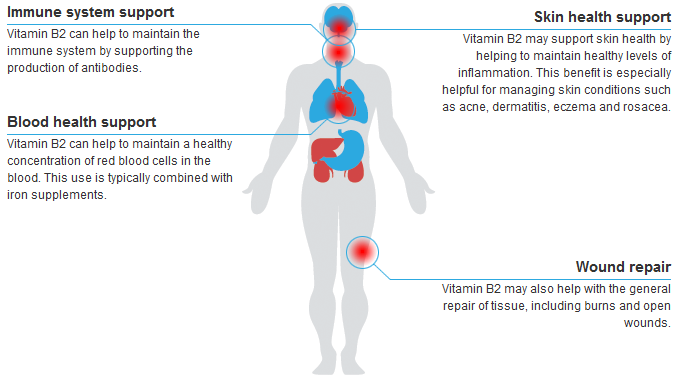Vitamin B2, also known as riboflavin, is an essential nutrient discovered in the early 20th century that plays a crucial role in various biochemical processes, especially enzyme reactions that activate other vitamins, and is found in yeast extract, dairy products, leafy vegetables, meat, fish, and organ meats.
Vitamin B2 is a vitamin in the B group commonly known as riboflavin. It serves a variety of biochemical roles, especially enzyme reactions that activate other vitamins.
The American biochemist Elmer Verner McCollum discovered an essential factor in human nutrition in 1915 that he named vitamin B. During the 1920s, biochemists gradually determined that this factor had at least two components, including a heat-sensitive component they called vitamin B1 and a heat-stable component they called vitamin B2. The American nutritionist Paul Gyorgy and others finally separated these two components in 1933 by using egg whites. The Austrian-German biochemist Richard Kuhn determined the structure of vitamin B2 and synthesized it in 1934.
Vitamin B2 is chemically classified as a flavin from the Latin word flavus, meaning “yellow.” Flavins are so-named because they quickly turn yellow in the presence of oxygen. Vitamin B2 was originally known as ovoflavin since it was a flavin derived from eggs. It was later renamed "riboflavin" since it’s derived from the sugar ribose.
Yeast extract is one of the richest dietary sources of riboflavin. Additional foods that are high in riboflavin include dairy products, leafy vegetables, meat, fish, and organ meats. Unrefined cereal grains are also common dietary sources of riboflavin. However, the refining process removes the majority of vitamin B2 from cereal grains since this nutrient is concentrated in the outer layers of the grain. Many cereal manufacturers therefore add vitamin B2 and other nutrients to their products.
Many liquids also need to be supplemented with vitamin B2, including sauces, beverages, and milk products. However, this is difficult to accomplish with pure riboflavin, which is only slightly soluble in water. Manufacturers often use riboflavin-5'-phosphate to add vitamin B2 to food and health supplements, since it is significantly more water soluble than riboflavin.
Riboflavin-5′-phosphate, also known as flavin mononucleotide (FMN), is made by using the enzyme riboflavin kinase to catalyze a reaction with riboflavin. It’s a strong oxidizing agent that plays a role in many reactions involving the transfer of multiple electrons. Riboflavin-5′-phosphate is also the principal form of riboflavin in the body, although it requires more energy to produce.
Having low Vitamin B2 status is a risk factor for anemia and also contributes to elevated concentrations of homocysteine, a risk factor for cardiovascular disease. Deficiency in Vitamin B2 has also been linked to the development of high blood pressure.
Vitamin B2 is an essential element in human nutrition, so it provides many specific health benefits. The most common uses of vitamin B2 includes support for the skin, blood, immune system and general repair.
Vitamin B2 can help to maintain the immune system by supporting the production of antibodies.
Vitamin B2 can help to maintain a healthy concentration of red blood cells in the blood. This use is typically combined with iron supplements.
Vitamin B2 may support skin health by helping to maintain healthy levels of inflammation. This benefit is especially helpful for managing skin conditions such as acne, dermatitis, eczema and rosacea.
Vitamin B2 may also help with the general repair of tissue, including burns and open wounds.

The most common symptoms of a riboflavin deficiency include inflammation of the mouth, lips, throat and tongue. It can also cause an oily rash on the scrotum and vulva as well as the nasolabial folds and lips. Additional signs that you may need vitamin B2 include watery eyes, light sensitivity and anemia.
Riboflavin, Riboflavin-5′-phosphate
Hilary J Powers, Riboflavin (vitamin B-2) and health, The American Journal of Clinical Nutrition, Volume 77, Issue 6, June 2003, Pages 1352–1360.
McCartney DM, Byrne DG, Turner MJ. Dietary contributors to hypertension in adults reviewed. Ir J Med Sci. 2015 Mar;184(1):81-90.
Shipping calculated at checkout
